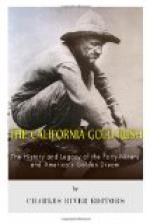Sunday evening usually ended by a dance. As women were entirely lacking at first, a proportion of the men was told off to represent the fair sex. At one camp the invariable rule was to consider as ladies those who possessed patches on the seats of their trousers. This was the distinguishing mark. Take it all around, the day was one of noisy, good-humored fun. There was very little sodden drunkenness, and the miners went back to their work on Monday morning with freshened spirits. Probably just this sort of irresponsible ebullition was necessary to balance the hardness of the life.
In each mining-town was at least one Yankee storekeeper. He made the real profits of the mines. His buying ability was considerable; his buying power was often limited by what he could get hold of at the coast and what he could transport to the camps. Often his consignments were quite arbitrary and not at all what he ordered. The story is told of one man who received what, to judge by the smell, he thought was three barrels of spoiled beef. Throwing them out in the back way, he was interested a few days later to find he had acquired a rapidly increasing flock of German scavengers. They seemed to be investigating the barrels and carrying away the spoiled meat. When the barrels were about empty, the storekeeper learned that the supposed meat was in reality sauerkraut!
The outstanding fact about these camps was that they possessed no solidarity. Each man expected to exploit the diggings and then to depart for more congenial climes. He wished to undertake just as little responsibility as he possibly could. With so-called private affairs other than his own he would have nothing to do. The term private affairs was very elastic, stretching often to cover even cool-blooded murder. When matters arose affecting the whole public welfare in which he himself might possibly become interested, he was roused to the point of administering justice. The punishments meted out were fines, flogging, banishment, and, as a last resort, lynching. Theft was considered a worse offense than killing. As the mines began to fill up with the more desperate characters who arrived in 1850 and 1851, the necessity for government increased. At this time, but after the leveling effect of universal labor had had its full effect, the men of personality, of force and influence, began to come to the front. A fresh aristocracy of ability, of influence, of character was created.




